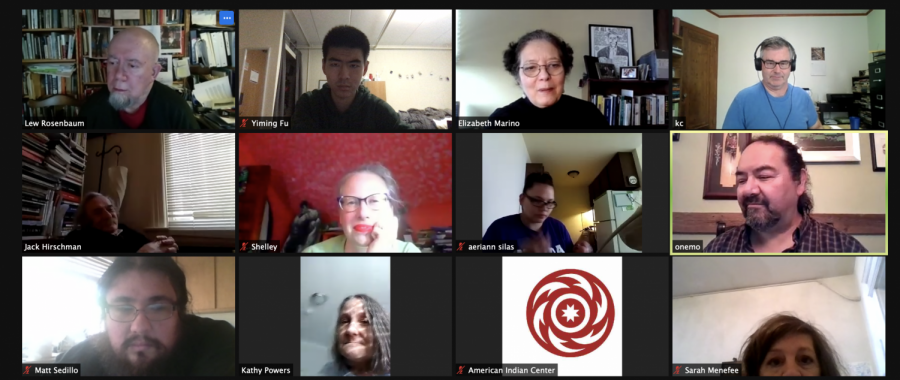Poets criticize policing in American Indian Center reading
Moderator Vincent Romero kicks off the American Indian Center of Chicago’s Wednesday “Night of Poetry” event with a short poem. Twelve poets read over 40 poems across the night.
May 20, 2021
Twelve poets read over 40 poems covering a wide range of topics — including barriers to mental health care, family stories and the cacophony of sounds made when frying chicken — during The American Indian Center of Chicago’s Wednesday “Night of Poetry” event.
Every month, local and national poets attend the event to read aloud recent works and hear poems from peers.
Vincent Romero, who is of Laguna Pueblo descent moderated the American Indian Center of Chicago’s Wednesday “Night of Poetry” event and opened with a “ditty,” or short poem, before kicking the event off by introducing the next reader.
“We just like to have fun here,” Romero said.
Elizabeth Marino began with her poem “Stew for Two Voices” which uses a mundane stew cooking scene to comment on police brutality and show how young people have dealt with an onslaught of trauma.
The poem starts with simple step by step instructions for making stew.
“Stir until brown and fragrant, your best wooden spoon,” Marino read. “The use of deadly force is entirely justified.”
Lew Rosenbaum, a poet and member of the League of Revolutionaries for a New America, said recently it has been hard for him to read anything without thinking about police brutality in the United States and Israeli military violence in the Middle East.
Rosenbaum read a poem called “November at the 11th Hour,” a twist on Armistice Day, which celebrates the Allied powers signing a ceasefire that ended World War I on November 11, 1918.
This celebration is ironic for Rosenbaum.
“It seems to me we need a peace initiative of our own cities and towns where violence claims the lives of thousands,” he read from the poem.
Rosenbaum also criticized the United States government’s spending priorities. He said that the $3.3 billion in annual aid to Israel for foreign military financing could be spent in other ways within the United States, like housing people experiencing houselessness or educating children.
As Rosenbaum and other poets read aloud, participants used Zoom reactions to affirm points and they snapped at the end of each poem.
Like Rosenbaum, poet and social activist Jack Hirschman criticized Israel’s history of displacing Palestinians in his poem “The Nakba Campaign.” He condemned former president Donald Trump’s decision to declare Jerusalem the capital of Israel and described Benjamin Netanyahu, Israel’s prime minister, as “corrupt.”
Hirschman then transitioned subtly into his second poem, one about police brutality, by saying he would start it off with a quote.
“I didn’t do nothing serious man…” Hirschman began. “Please, please please….” he continued, quoting George Floyd’s last words. Former Minneapolis police officer Derek Chauvin murdered Floyd last May, sparking national outrage, protests and demands for systemic change to protect Black lives.
Following Hirschman’s performance, participants remained silent for a few seconds.
Romero stepped in, saying one of the reasons why the American Indian Center of Chicago started the “Night of Poetry” event was to put words out “into the universe.” He added that poetry is an important way for all feelings to be heard.
“Even words that are as brutal and shocking as that last quote need to be added to the universe,” Romero said. “So we remember. So we remember and learn.”
Email: [email protected]
Twitter: @yimingfuu
Related Stories:
— Poets examine dual cultures in Mitchell Museum storytelling event
— A journey toward healing with poetry therapy
— “Poetry disarms people”: ETHS grad Liana Wallace on her spoken word poetry


